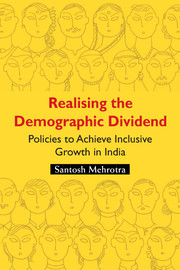Book contents
- Frontmatter
- Contents
- List of Tables and Figures
- Preface
- Acknowledgements
- Part 1 Growth, Employment and Inclusion
- Part 2 Human Capital Formation
- Part 3 Building a System of Social Protection
- Part 4 Governance
- Chapter 15 Two Pre-requisites for Optimum Governance: Deep Fiscal Decentralisation and the Bureaucracy's Ability to Learn
- Chapter 16 Addressing Left-wing Extremism: Encourage Peace to Secure Development — or the Way Round?
- Index
Chapter 15 - Two Pre-requisites for Optimum Governance: Deep Fiscal Decentralisation and the Bureaucracy's Ability to Learn
from Part 4 - Governance
Published online by Cambridge University Press: 05 June 2016
- Frontmatter
- Contents
- List of Tables and Figures
- Preface
- Acknowledgements
- Part 1 Growth, Employment and Inclusion
- Part 2 Human Capital Formation
- Part 3 Building a System of Social Protection
- Part 4 Governance
- Chapter 15 Two Pre-requisites for Optimum Governance: Deep Fiscal Decentralisation and the Bureaucracy's Ability to Learn
- Chapter 16 Addressing Left-wing Extremism: Encourage Peace to Secure Development — or the Way Round?
- Index
Summary
The 1990s saw the spread of democracy in the developing world, especially, in Latin America, Africa and the formerly communist Eastern Europe. It was also the decade of the spread of decentralisation. By the beginning of the 1990s, there was growing recognition in developing countries that since hierarchical control was not successful in ensuring delivery of basic services, greater decentralisation of governance was needed. In other words this spread of decentralisation in the developing world, following upon the heels of the rapid spread of democracy, seemed like a call to governments for democracy and decentralisation to reduce the gap between the government and the people.
Unfortunately, often this effort of decentralisation in many countries coincided with an international effort by powerful donors to promote decentralisation. The international financial institution launched their ‘roll-back the state’ campaign after the fiscal deficits of overly stretched developmental states grew to unmanageable levels. In other words, international pressure for decentralisation was driven by the desire for reducing fiscal pressure on central government and macro-economic equilibrium rather than for human development or participation in the form of promoting the voice of local communities.
However, decentralisation recommended by international financial institutions (IFIs) in a context of unresponsive centralised states inherited from colonial times, continues to face problems. While decentralisation spread rapidly during the 1990s, the experience with it has not been as notable for success as one might have expected. Like other developing countries, India initiated a wave of decentralisation dating from 1993, with Parliament passing constitutional amendments to introduce a three-tier system of local governance (the Panchayati Raj system) in rural areas and also to directly elect municipal government for urban areas. While the Indian decentralisation effort was not triggered by pressure from IFIs, it is true that it came only two years after the structural economic reforms were initiated in 1991. The experience of India with decentralisation has not led to massive changes in effectiveness of service delivery or levels of human development.
There are conceptual and empirical reasons why decentralisation provides a good enabling environment for enhancement of human capabilities. This chapter begins by exploring the conceptual reasons for this phenomenon.
- Type
- Chapter
- Information
- Realising the Demographic DividendPolicies to Achieve Inclusive Growth in India, pp. 427 - 457Publisher: Cambridge University PressPrint publication year: 2015



